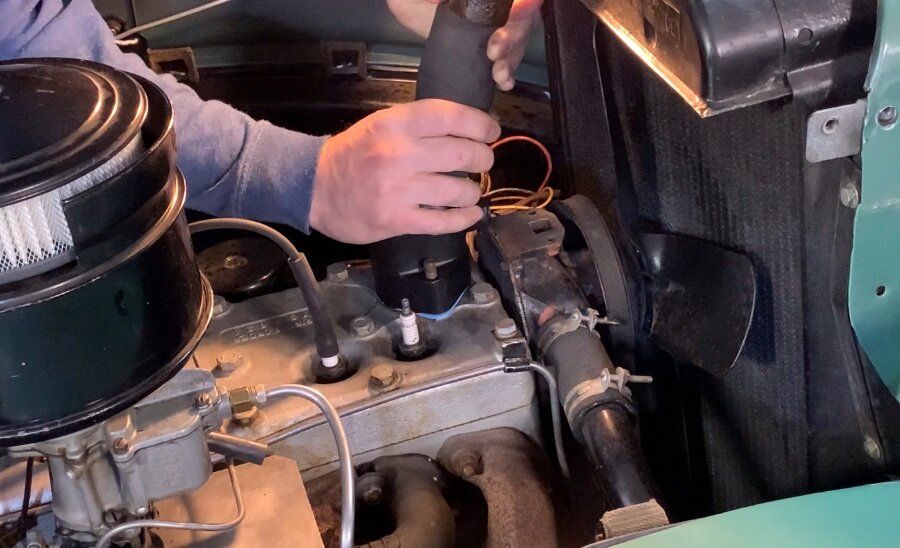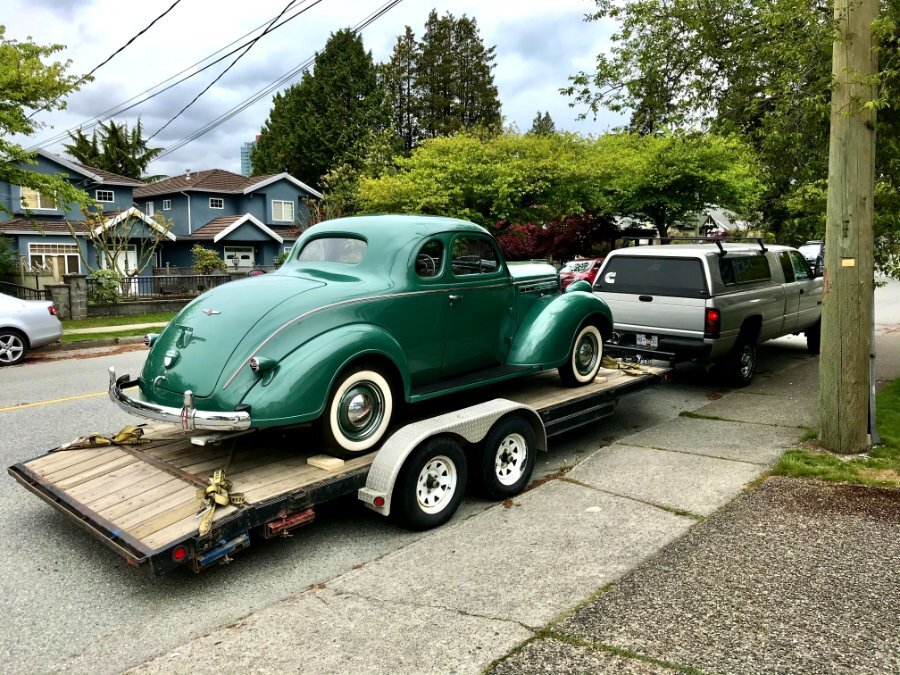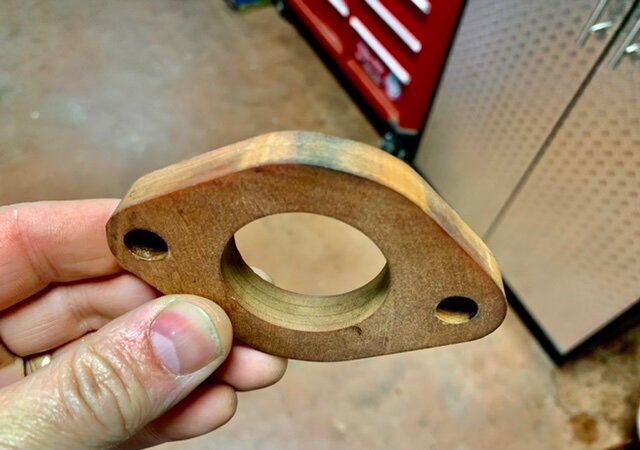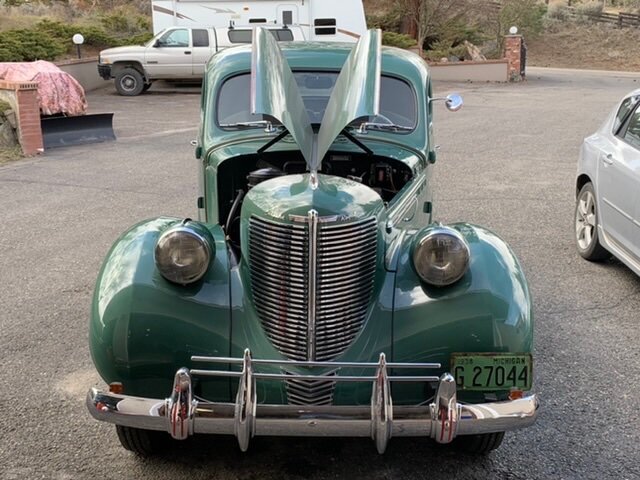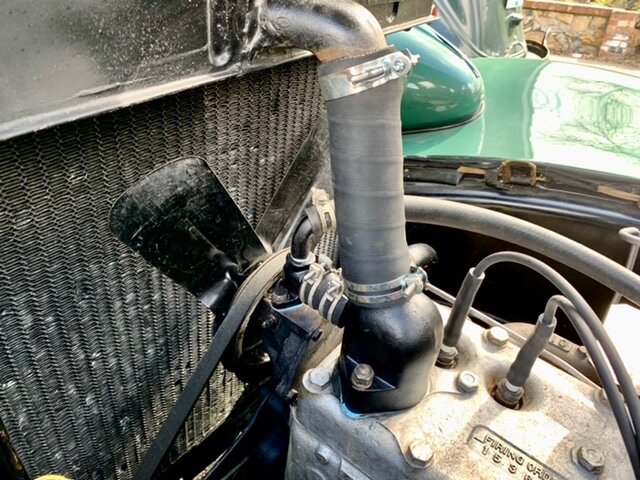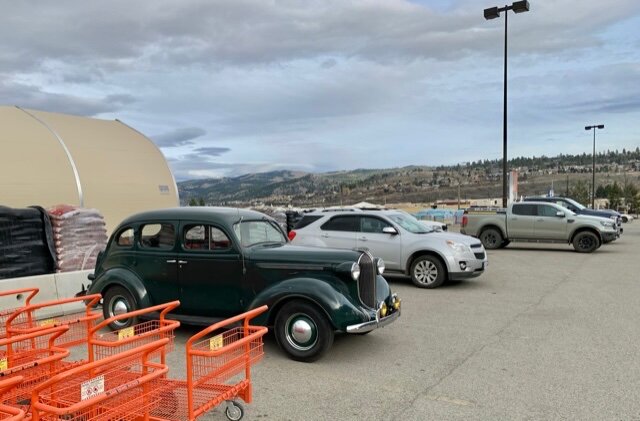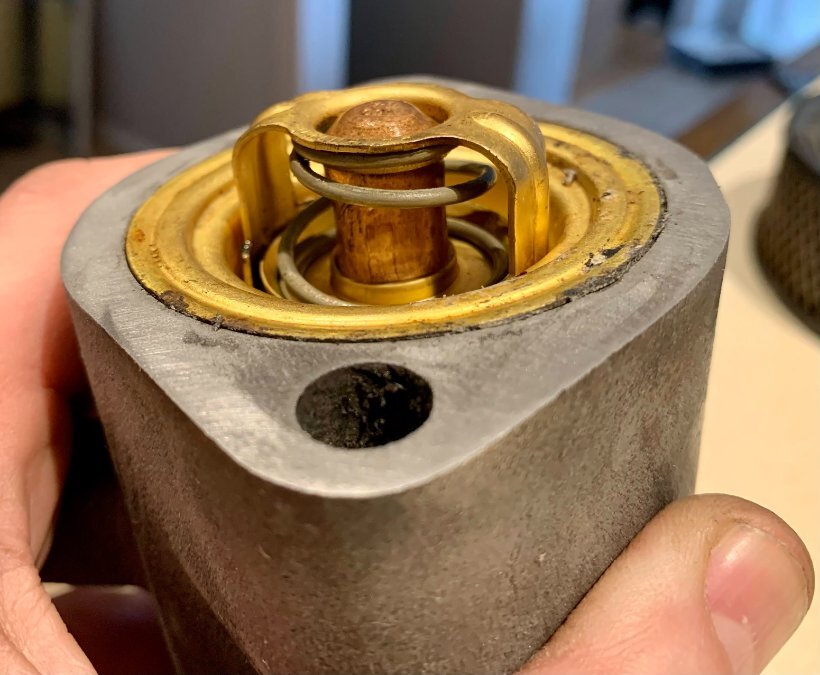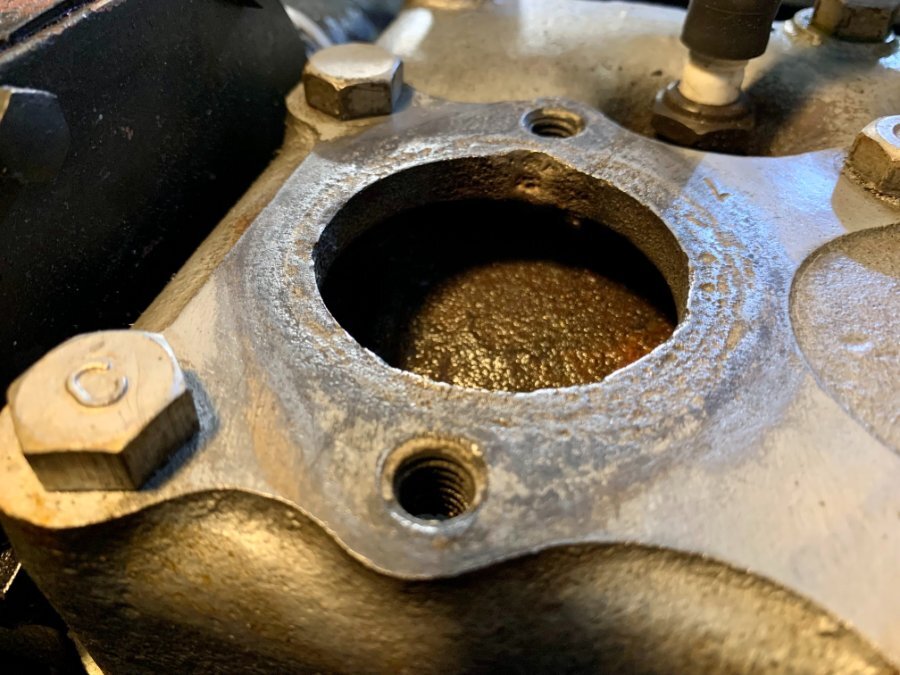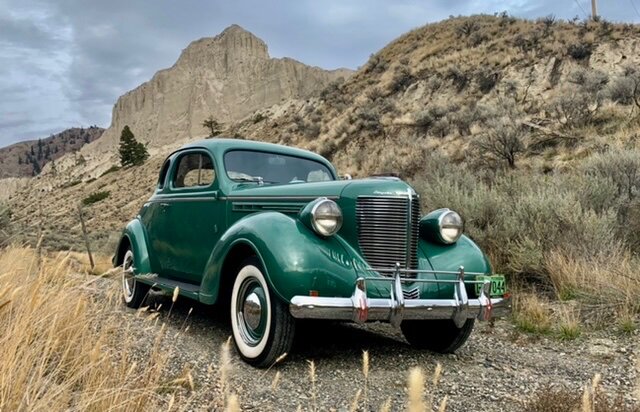-
Posts
3,467 -
Joined
-
Last visited
-
Days Won
193
Content Type
Links Directory
Profiles
Articles
Forums
Downloads
Store
Gallery
Blogs
Events
Everything posted by keithb7
-
1951 Desoto, you mentioned. Looks to be a coupe that someone had been fixing up. The flathead 6 engine, appears era correct. Once you gather the engine SN we can comfirm. I believe these were 251 ci engines in ‘51. 3 7/16 bore x 4 ½” stroke. Decent torque. Solid, reliable engines. Based on the pic is looks to be a 25” block to me. The tag on the firewall could be deciphered to reveal some more trim details on the car. Original paint color etc. In terms of rarity or value, these old Mopar sedans were mass produced. They don’t generally attract a high resale dollar. So they are easy to get into. Parts are readily available. There is tons of support here. We all love our old Mopars dearly. They are great cars for the next generation to learn on. A 2-door is generally more appealing to the public and future buyers. Personally, I think the sedan is on equal footing. More doors = more people and fun. Is this Desoto a 3 speed manual with dry clutch? Or fluid drive? The upgraded disc brakes is a bonus. The distributor and rotor area looks old. The block paint new. You may want to confirm how the engine is being advertised. Ran when parked? Rattle can rebuild? Or full rebuild with new parts and machining? Big difference. If you have any questions before you buy, feel free to ask. Keith
-
Ok. I’ll admit. Call me a Monkey’s song. I’m a believer. We are in San Francisco this weekend. Pedal assist bikes. We rented them for the whole day. We covered a lot of ground. They sure are nice. 4 of us. We’re among the converted.
-
Good point @sidevalvepetecould be out a bit. Yet my 170 thermostat seems to regulate nicely when steadily cruising on the hi-way. Seems to read steady in the 170 range on the gauge. I like the idea of a 6 blade fan and a shroud.
-
I’m reading these cooling threads. Taking it all in. I’m second guessing my thoughts about what I think is “getting hot”. 200F to me getting pretty hot. But not to some others here. Being as 212F or so is boil over point isn’t it? Depends on system pressure (cap), elevation, % of glycol, etc. I agree, if I keep driving and air is moving through the rad, it doesn’t boil over. Again, pending my travel speed and ambient air temp. My water pump has multiple vanes. I firmly feel that my cooling system is in tip-top shape. I’ve been through it all. Boiled the block. New WD tube. New W pump, belt, hoses, thermostat re-core’d the rad all fins new & clean. New rad cap. It all works well as a system . To re-state the obvious, it still gets up to 190F up the hill home. It ain’t even summer yet!
-
Each pair of cylinder is “Siamese’d”. Water does not flow between each pair. Connecting rods are also offset in pairs to match. As all rods are not spaced evenly apart across all 6 rods. Having the coolest water from the water pump, directed at each exhaust valve is pretty nice. From each exhaust valve it flows across the block. Pretty cool design I think. In my experience it works but it does border on not being quite cool enough. Regular driving around town, on the hiway too. No problem. 160 easily maintained. Climb a long steep 11% grade hill. 2nd gear 25 mph steady. She gets warm. 200 F comes up fast, at 35 ambient air temps. This is with a fresh serviced cleaned rad. New thermostat. Newly flushed and rebuilt engine. Very clean block. New water-pump. New belts. Good original fan. Air shrouds in place. It all works, it’s just borderline sometimes. Under hot summer, heavy load, lower speed drives. To be expected I suppose for its design age. It hasn’t boiled over (bwry close) so I guess its all good. I used a round punch and a lighter ball peen hammer to flare the edge of the water distribution. Ensuring it was sealed tight against the block.
-
I ask the guys in the local vintage car club that I am in about trailer rental. There are a few decent trailers I have used. I pay them for my usage. Tires, brakes, lights, maintenance, insurance. It adds up so I am sure to pay them. One time the trailer I borrowed was in a much needed state of repair. I am glad that I went over it before my trip. It had rusty seized internal brake parts. Way out of adjustment. All wheel bearings needed grease. The tires were low. Brake breakaway system was not functioning. Needed wire repairs and a new battery. I took care of all of it. Then the owner would not let me pay him for my usage. Fair trade. One of the trailers I have borrowed from nice club members who are great guys!
-

Dodge DR Convertible Coupe comes out of winter hiberation....
keithb7 replied to Semmerling's topic in P15-D24 Forum
That’s one heck of an entrance and debut post. Quite a car! Lovely. What is the bore, stroke and engine displacement? Quite an era for Dodges. Among the classiest they ever offered. -
-
I think we all handle stress differently depending on many things. Our life and work experience can be a big help with managing your work load. Your genetics too. How our brains function. Our chemical make up. Our anxiety levels is a real big one. People can and do wig-out about little things beyond their control at work. They can’t help it. Little things may drive them nuts. Sometimes medication is required.
-
I have a phenolic spacer here that I had a friend cut for me. I’ve yet to try it. It will lift everything higher. New challenges include but are not limited to: Rigid fuel line to the carb no longer fits. Sisson choke linkage issues. Now too short. Longer mounting studs needed. Throttle linkage needs customization. Not the least, the engine torque curve changes with the new venturi spacing! Vroom. Vroom!
-
These fuel and heat discussions have raged on so many times. All our questions are not fully answered nor settled in our minds. Winter fuel. Summer fuel. Percolation. Vapor lock. Mechanical pumps. Electric pumps. Float level. Choke action. Flooding. Timing advance. 6V cranking speed. Heat shields. Ethanol fuel. Compression. Valve sets. Ambient air temps. On and on, the variables keep coming in. Controlled testing. Monitoring. Take Notes. Will all help sort your particular situation out. I believe all situations are unique.
-
One little intricacy I have noticed with my recently rebuilt flathead. When the engine is stone cold, I flip on my electric pump for a few seconds to build pressure and ensure the carb bowl is full. I then turn the pump off again. I give the throttle 1 pump to stroke the accelerator pump once. Injecting shot of raw gas into the intake. It does not atomize at this point as everything is cold. I hit the foot starter and she rolls over super clean and quick. Fires up in less than the blink of an eye. A hot engine, this spring, that very well likely has winter gas in the tank; after sitting for 15 mins or so, it is a little stubborn to start. I do not give it any throttle at all. I hear the starter straining more. Definitely laboring more to crank the engine over. The battery is certainly not weak and the generator is working very well. It was just rebuilt too. I too believe this is from percolation. The fuel boiling out of the carb. Flooding it while sitting. I know my exhaust manifold diverter valve is working. I just rebuilt it and tested it. I run the fuel pump heat sink plate. I run a heat sink plate at the bottom of the carb. I have a rebuilt mechanical fuel pump and carb. Electric pump for back up and priming. Seems to me it's likely a winter fuel problem in my example. We'll see. My laboring starter to me is an indication the engine is flooded. The tonal difference in the starter turning over is a clue to me.
-
I’d be inclined to monitor it more before throwing a pump at it. We know your engine was at full operating temp. This actually takes a while. 180 on the temp gauge does not mean its warmed up. It means the hottest part of the engine, the cylinder head is warmed up. The other 700 pounds of steel and oil takes a wile to heat up fully. Meaning short trips 15 mins or so and less, then shutting it off for for fuel at the gas station the engine is not quite a big heat sink yet. After your longer drive it was indeed a massive hot, heavy, chunk of steel. You shut the engine off for 15 mins. Is it possible the carb bowl percolated? Yes. What about the fuel in the filter. Where did it go? Drain back thru the fuel pump to tank? Doubtful. The fuel pump 1 way flow valves prevent that.
-
I was in a similar situation working corporate. I became tired of the what often felt like silly games. Seemingly internal corporate ladder climbers and their new ideas were driving me nuts. I was frustrated for a long time. I was making good money. I did so for a long time. I pushed through and found ways to deal with things and stay positive. Work was controlling my life too much. I felt a lot of pressure to keep my family in the life they were accustomed to. It was self induced. My wife never pressed me. Yet all those years we squirrelled away savings too. Paid things off. We lived a good spoiled life in a lot of ways. Yet I was paying a hard price for it. I was telling myself “10 more years. I’m 55 in ten years. I can make it. Then likely I can retire.” I told myself that for 5 more years. A near nervous breakdown came on. I was sick and tired. Frustrated. I had been looking around at other job options. I had 17 years in at this company. I did not want to start over new, somewhere else. I work for a pretty big company. There were options. I’d bring home less money. Yet I’d be home every night. I live 5 mins drive away from my work. I could take an office job. A coffee maker and a personal fridge in my office! Big windows. Heat and A/C. A comfortable desk and all. I was well respected in the company by many. For my experience and work ethic. A new job, within the same industry was available to me. I applied. The money hit was more than I was willing to bear. I had the skills and experience. I knew I was worth more. I tried to negotiate a better wage. They couldn’t move. I waked away. 6 months later I was still feeling pretty frustrated . I went back. I took the job. I earn less income. Yet I am happy. The new job is fulfilling. The days, weeks, and months fly by. I am mentally stimulated. I work in an environment not entirely different from my old cars hobby at home. My work experience is helping me a ton in my new job and in my car hobby at home too! My co-workers are appreciative and supportive. No more frustration. I put in a good day’s work and I actually accomplish a ton of stuff. It’s quite rewarding. People appreciate what I bring to the work environment. Financially my wife and I adjusted. As mentioned, we had saved a lot. Thats our retirement nest-egg. We continue to save the same amount for retirement each year. We just spend money less day to day. The kids are all grown up now. They are costly little projects! Yet not any more. We are both happier. My wife too. I’m very glad to have made the move. A very good decision for me. It was a tough decision to come to. I pressed on for years, continuing to be unhappy at work. I came to realize that life’s too short. Adjust accordingly while you have the choice. I understand everyone’s financial situation and personal life is different. I won’t direct you what to do. Just sharing my experience so you have some support to help you make a decision.
-
I notice similar trends. I'm well on my way to a grumpy old man. Lol. Maybe some of the changes are based on all the things our rear view mirror. We experience so much in life. We may have been misled. Trust broken. We've be hurt. We know what makes us tick by now. We know what makes us happy. We see the thin "entertainment" value in Hollywood productions. Popular TV shows are mostly fake distractions from reality. We see right through the misleading crap because we've been there. Done that. Know what it takes to get it done. I am not entertained by so called "reality TV". It's far from reality. I might watch 1 or two movies per year. TV? None. Crap that goes on in the background. My wife likes it. Me, nope. 5 minutes in, I'm done. I look forward to someday, hopefully filling my days with things I want to do. Not that I want to speed up time to retirement. I am happy and fulfilled at work. Its just that work takes up the best of my day. We get 2 days per week to try fit in everything we want. I think cooking and nice meal prep could be fun. I just seem to have little time for it. Wrenching on cars. Troubleshooting. Driving them. It's stimulating. Relaxing and fun. Seems to be good exercise for the brain. This web site supplements that. So, we come here where people have similar interests.
-
I choose to take my flathead Mopars to town over any other newer vehicle I own! Thanks Walt, 'ya done good.
-
I am interested in digging in and learning the facts behind lugging a flathead engine, and the results of too doing it too much. A group discussion with your input, experience and knowledge is welcome. Lugging, I believe is the act of putting the engine under heavy load while at lower rpm. Maybe your throttle is ¾ open or more while travelling at a lower road speed, under a heavy load. An example might be climbing a steep hill in a high gear. Say 3rd gear in an old 3 speed manual transmission. 1:1 output ratio on the tranny. Depending on your rear-end gear set, tire size, and how much weight you are trying to move. The number of passengers. Luggage. Tools, water jug in the trunk, amount of fuel in the tank, etc, all have quite an effect on the old flathead engines. What actually is going on in your engine when you lug it? Some thoughts I have include: Little to no vacuum. With the throttle is wide open the cylinders are sucking in all the air possible through the carb intake. If the engine is generating little to no low vacuum, I assume we have little to no vacuum advance. Is the timing retarded in these conditions? The rpm's are low, so centrifugal advance is maybe not having much of an effect either? If so, then I assume timing is retarded under these conditions? Is it? It seems to me the engine produces more heat when lugging. I can think of maybe a couple of reasons. The car is moving slower, the engine RPM's are lower so the fan speed is slower. There is less air moving across the rad. So it's not able to cool very well for the amount of fuel being burned. The water pump is turning slower, less volume moving through it. I can't be sure, does the combustion flame burn and travel in a way that is further damaging? Inefficient? Does it contribute to carbon build up? Lugging under heavy load must have an effect on the crank rod and main bearings I assume. The weight of the car, going up a steep hill is bearing down heavily on the crankshaft. The reciprocal stresses I suspect are great. The results of internal combustion drives the piston down, turning the crank around in a circle by-way of the rods. The throws of the crank 90 degrees to the piston travel, manipulate torque. The weight of the car and the load up the hill are fighting against this rotating mass. The stresses immense I presume. A weaker crankshaft might twist or break under such stress. High quality clean oil in that 0.0025" bearing to crank clearance is really, really doing its job at this point. Engine bearings are prone to accelerated wear I assume? For what reason do people lug their engines? To try and maintain a faster rate of speed while navigating a steep hill? Pushing the engine to its limits, proudly thinking, "I can climb that hill without dropping a gear? If you do drop a gear, the engine rpm can be maintained at a steady reasonable rate. You will indeed climb the hill slower. You'll have your throttle partially open, versus wide open in top gear. The cooling fan turns faster. You're probably putting less fuel in each cylinder with each intake stroke. More fuel means more heat. The engine stays cooler. Is there less stress on the crank and bearings? I suspect so. Lugging the engine, the silent engine killer?
-
Today my ‘38 Chrysler was on the agenda. The thermostat housing and by-pass parts were reassembled. All new hoses & gaskets. Housing surface was milled 0.025”. The cylinder head mating deck pitting got a smidge of JB Weld, a file and then sanded. Seems all good now. Then she got an oil change and filter. The stock fuel/vacuum pump rebuilt and installed. If you recall when I bought this car is had an incorrect pump and a fuel pressure regulator. The Axles greased. I’ll buy annual insurance this afternoon then its ready for driving season! I welcome anyone with any ‘38 Mopar to contribute to my thread. Let’s see all those ‘38’s! -Keith
-
This evening out for bit of a rip. Headed to get a thermostat housing gasket for my other ‘38. Heather was with me as she needed to run into Home Depot for a few things. I started up the fresh engine. Heather commented “So you don’t use your key to start it? You did something with your foot?” I laughed. I’ve owned the car for 4 years. She’s been with me countless times. She’d never noticed before. She said “Nobody could ever steal this car. They’d have no idea how to start it”. “Nor shift gears” I replied. Headed off to grab a coffee next. Park and enjoy the view.
-
Naw. I’m not messed up or confused. I figured some members here could maybe learn a little from my example. I open my myself up to criticism I suppose. Yet its worth it to help others.
-
Yes, the leak was between water neck and cylinder head. I will try JB weld at the head surface area. Then block sand it.
-
My 1938 Chrysler. It seems this area was overlooked when the 25" 251 engine was last rebuilt. It has been leaking. Now i can see why. We milled the water neck today. Took 0.025" off it. We cut a new thermostat groove. Now I will deal with the cylinder head surface. The left brain lobe is saying don't take the head off at this point. I am thinking JB weld and block sand it. Yet I will admit, my right lobe is interested in taking the head off. Yet the left side knows I'll open another whole can of worms. Not at this time. Not right before cruising season!
-
I imagine Mopar cast countless tons of steel for industrial 265 engines for probably 20+ years. I keep my eyes peeled. Farm combines. Welders. Water pumps. Airport tugs. To name a few. I imagine a very large portion of those applications have long since been scrapped. There definitely is some old mechanized farm equipment out there laying in fields rusting. I thoroughly enjoyed rebuilding my 237 engine. I would love to build up a 265. Good luck in your search. I did find a straight 8, but the owner seems to think its a Dusenberg. Mother nature is taking it back.
-
If you zoom in on the picture you can see a child standing behind the seat. This small area was opened up so the family could all fit in the coupe. The cowl between the trunk and the cab was cut out to make “standing room” for the kids. It was re-constructed by the owner previous to me.





